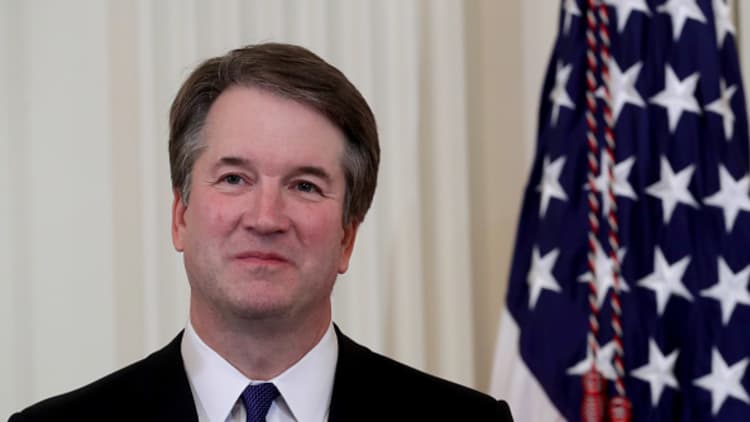Brett Kavanaugh, President Donald Trump's second Supreme Court nominee, still has a long way to go before he gets his confirmation vote in the Senate.
The Constitution makes the path from nomination to confirmation appear pretty simple: Under Article II, the president has the power to nominate Supreme Court justices "with the Advice and Consent of the Senate."
But Kavanaugh will also have to abide by rules that have been tacked on to the process by lawmakers in recent decades, as well as navigate the unique hurdles of a government gripped by partisanship during the Trump administration.
In his announcement speech at the White House on Monday night, Kavanaugh indicated he would be diving into that process immediately.
"Tomorrow I begin meeting with members of the Senate which plays an essential role in this process," Kavanaugh said Monday night. "I will tell each senator that I revere the Constitution. I believe that an independent judiciary is the crown jewel of our constitutional republic."
In due course, Kavanaugh met on Tuesday with Senate Majority Leader Mitch McConnell, R-Ky. It is be the first of many meetings Kavanaugh is expected to take on Capitol Hill as he lobbies senators ahead of his confirmation vote.

"I think the president made an outstanding nomination," McConnell told reporters after the meeting.
Not all of Kavanaugh's meet-and-greets are expected to be so chummy. Senate Minority Leader Chuck Schumer, D-N.Y., has already vowed to oppose Kavanaugh's nomination with verve.
Sen. Elizabeth Warren, D-Mass., indicated her opposition in a tweet on Tuesday.
Mark Kende, director of the Drake Constitutional Law Center, said the one-on-one meetings are seen by some experts as a tactic to personalize the process between a nominee and his opponents, which could make it more difficult to vote "no" on the Senate floor.
"It's not rocket science in terms of what the purpose is," Kende said.
But the Democrats' base will likely steel their representatives against any potential changes of heart.
"They're going to be very, very aggressive" in their meetings, said Sara Fagen, a political strategist and CNBC contributor who has known Kavanaugh for years. Kavanaugh is "a very brilliant legal thinker, so I think he'll do great, but anybody in his position is going to have prepare significantly," she added.
With a 51-49 minority in the Senate, and Arizona Republican Sen. John McCain away getting treatment for brain cancer, Democrats not only need a united front to vote against Kavanaugh, but they also need to convince at least one GOP senator to break ranks in order to tank Kavanaugh's nomination. One of the potential swing votes on the Republican side, Sen. Susan Collins, R-Maine, called Kavanaugh's credentials "impressive" and pledged a thorough review before making her decision.
Prior to the nomination of Trump's first Supreme Court pick, Justice Neil Gorsuch, the Senate minority could potentially block nominee by requiring 60 votes to confirm him or her through the filibuster rules.
After blocking President Barack Obama's nominee, Merrick Garland, for nearly a year, Democrats tried to prolong the vote on Gorsuch — prompting Republicans under McConnell to change the Senate rules and eliminate the filibuster, thus requiring only a "simple" 51-vote majority to confirm a nominee.
Once Kavanaugh makes his rounds through the Senate office buildings, he is expected to voluntarily testify before the Senate Judiciary Committee in an open hearing. Much like a presidential debate, nominees to the high court spend significant time preparing for the hearings.
"You're trying to anticipate what kinds of questions people will ask you," Fagen said.
Ultimately, McConnell will be the one to bring a vote on Kavanaugh's nomination to the Senate floor. Fagen said there's no reason why the process of confirming Kavanaugh should take longer than the three-plus months it took to move Gorsuch from nomination to confirmation.
Few options for Democrats
But even if Democrats can't secure Republican votes against Kavanaugh, they may have a slim chance to delay the process beyond the Nov. 6 midterm elections.
Schumer tipped his hand on Tuesday, when he vowed to delay the nomination in the absence of reviewing documents that could be "critical" to his vote.
"The Senate must now be able to have access and time to adequately review all documents, emails, other paperwork associated with Judge Kavanaugh before the process moves forward," Schumer said.
For a judge who has authored nearly 300 opinions from the Circuit Court bench over more than a decade, that process could be extremely lengthy.
Schumer may be looking to leverage documents from Kavanaugh's time as an investigator working for independent counsel Kenneth Starr, who led an impeachment investigation against President Bill Clinton. Fagen said such documents would be "totally irrelevant" to the confirmation process.
There's no provision in the Constitution requiring Kavanaugh to comply with document requests from the minority party, but that accommodation has not been unusual for prior nominees.
In such a polarized legislative branch, however, one party cannot always rely on precedent.
"There's no advantage to Republicans letting this drag on," Fagen said.
WATCH: Where Kavanaugh stands on key issues

Clarification: This story was updated to include more detail about Collins’ stance on Kavanaugh.


